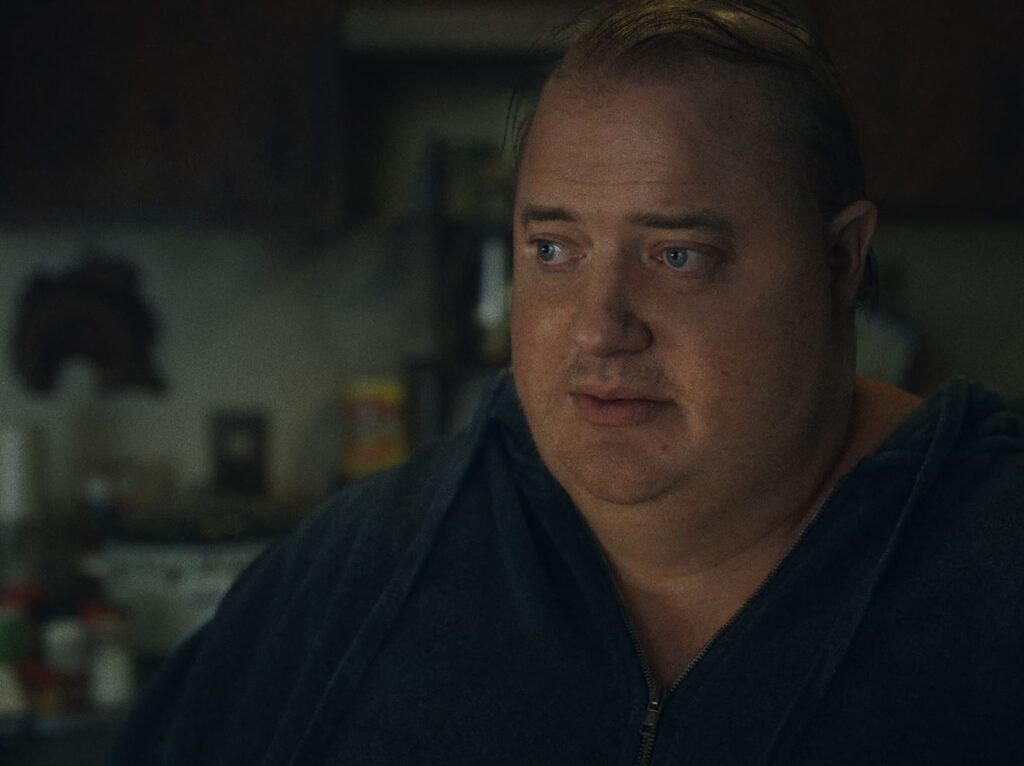
The first time we see Charlie, the protagonist of Darren Aronofsky’s The Whale, he’s masturbating to pornography on his couch. You might think that such a recreational pursuit would grant him enjoyment, but Aronofsky stages the scene with sober, funereal gloom. The lighting, by the cinematographer Matthew Libatique, is dark and muted; the music, by Rob Simonsen, is swollen and sinister. Charlie’s breathing is ragged, and the intensity of his effort presumably stems from his weight—a gargantuan 600 pounds. His obesity, we instantly realize, has plunged him into deep despair, such that even a ritual of pleasure has become a labor of misery.
Aronofsky is no stranger to depicting anguish, and Charlie shares with the director’s other heroes—the feverish addicts of Requiem for a Dream, the haunted dancer of Black Swan, the panicked housewife of mother!—an essential helplessness. Typically, Aronofsky amplifies this level of torment by wielding his own restless energy and rambunctious filmmaking imagination, but The Whale requires a more restrained approach. Based on a play by Samuel D. Hunter (who also wrote the screenplay), it’s an intimate chamber drama, set in a single location (Charlie’s Idaho home) and featuring minimal action or excitement.
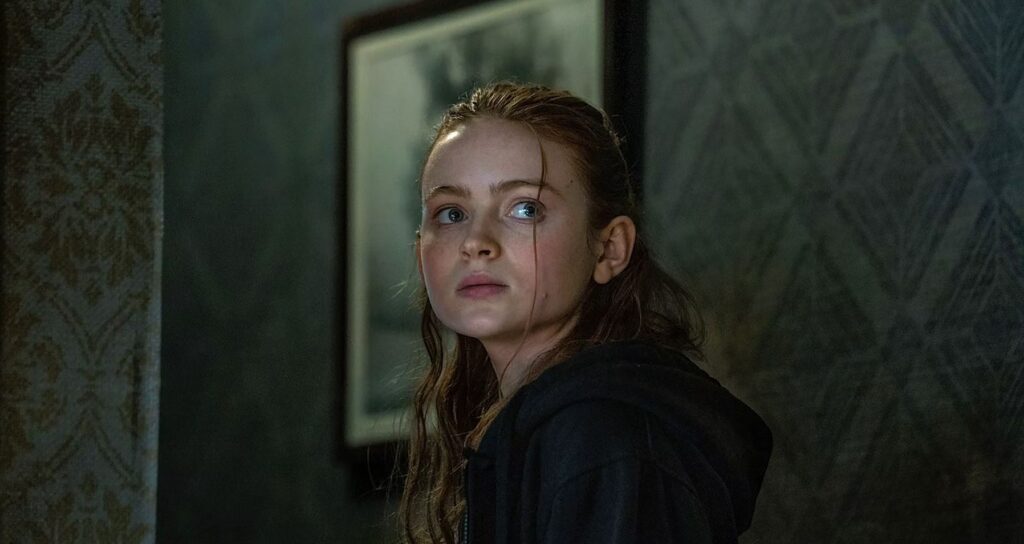
Things may not feel that way to Charlie, who is plainly on his last legs; his blood pressure is 238/134, and despite the entreaties of his friend and nurse, Liz (Hong Chau), he refuses to visit the hospital. He is instead resigned to the imminence of his demise, and he hopes to spend his final days reconnecting with his teenage daughter, Ellie (Sadie Sink), whom he hasn’t seen in nearly a decade. In a strange sense, The Whale operates as a ticking-clock thriller—the appearance of an early title card (“Monday”) confirms that its time span will be compressed—one whose suspense derives not from characters evading death or thwarting villainy, but from whether Charlie will find reconciliation with Ellie and a measure of emotional peace for himself.
This isn’t exactly the stuff of propulsive cinema, and Aronofsky struggles to channel his pulpier instincts into a story that is inherently static and staid. His response, in the face of such narrative austerity, is to balance the proceedings—a more accurate verb may be “overstress”—with grandiloquent agony. Every conversation is freighted with gravity and portent; every scene takes place under a shroud of incipient doom. As if taking his cue from Charlie’s condition, Aronofsky burdens the movie with such lugubriousness, it repeatedly collapses under its own weight.
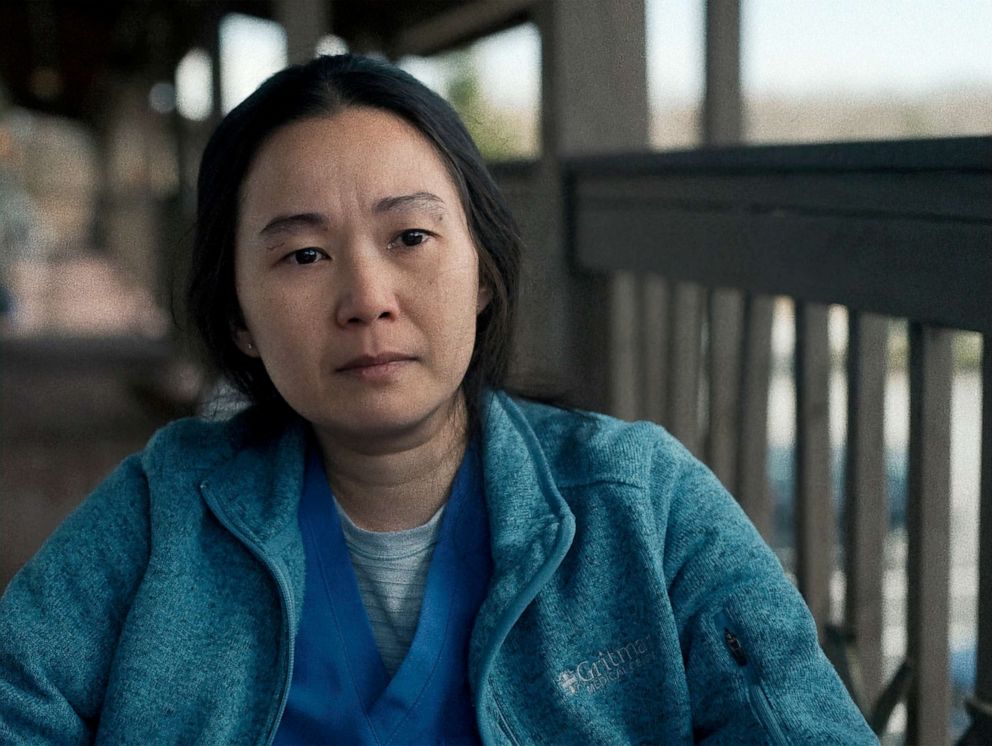
Yet despite this miasma of sorrow, the experience of watching The Whale isn’t entirely unpleasant. As befits its theatrical roots, it is primarily an exercise in acting. Aronofsky’s gifts as a showman may be hamstrung, but he nonetheless understands that the real reason we bought our tickets is to see skilled thespians exchange volleys of affected dialogue, and to one-up each other with displays of manufactured-yet-authentic emotion.
The headliner in this regard, of course, is Brendan Fraser, who plays Charlie under mounds of fleshy prosthetics. It’s one of those classic uglification roles that’s practically engineered to receive an Oscar nomination, but while Fraser ably conveys the torturous physical challenges of his character’s plight—for Charlie, a simple trip to the bathroom is an arduous journey—he only occasionally indulges in hammy overacting. For the most part, he plays things straight, articulating Charlie’s fear, anger, and exhaustion without undue embellishment. He is quite clearly just a guy in a fat suit, and his refusal to pretend otherwise lends the performance a certain integrity.
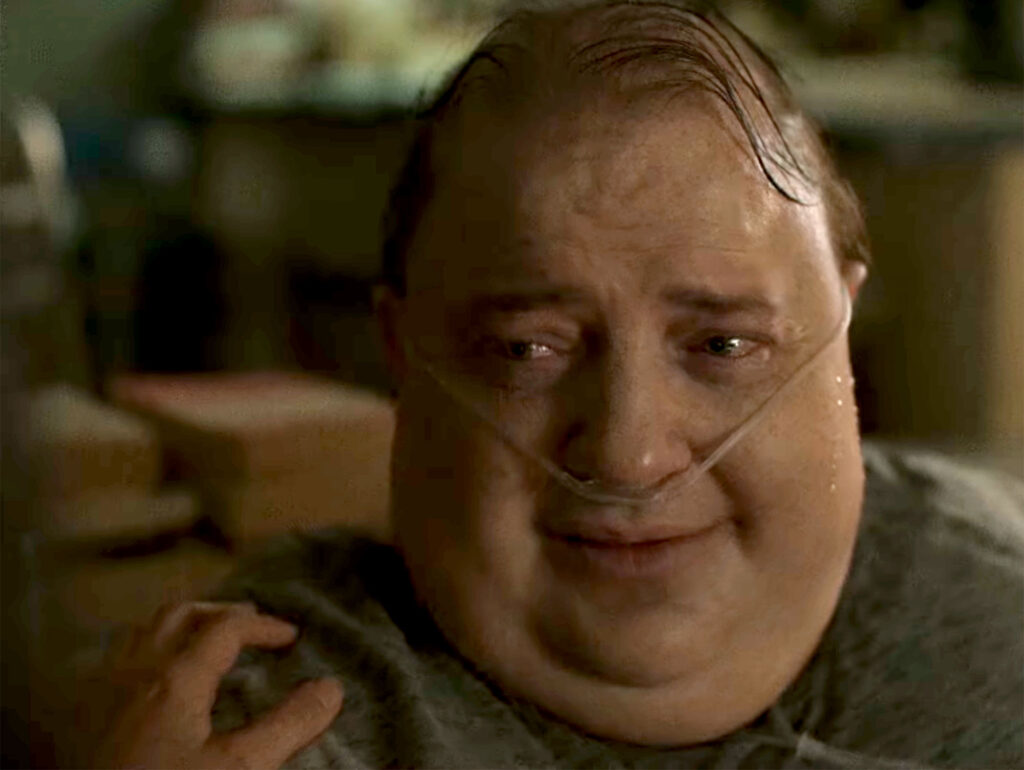
Fraser’s strongest scene partner is Chau, who matches her costar’s strenuous effort with refreshing bluntness and welcome irritation. The Whale is a resolutely glum picture, but the periodic sequences of Liz and Charlie arguing and bonding carry a sliver of genuine warmth. For her part, Sink does her best to rise above the contrivances and contradictions of her character, lending credibility to a role that is plainly a writer’s construct.
And there are quite a few of those. In terms of plot, The Whale is simultaneously malnourished and overseasoned, spiced up with dubious reveals and forced collisions. A missionary (Ty Simpkins) regularly appears in an effort to infuse the story with theological complexity, but he’s really just a delivery device—a vehicle to help Aronofsky and Hunter unload cumbersome backstory. There is a good deal of philosophical chatter—about religion, parenthood, suicide, forgiveness—but it amounts to little of personal or dramatic interest. The great Samantha Morton shows up briefly, in the second of her single-scene cameos in 2022 (following a riveting turn in She Said), but even an actor of her vivacity can’t salvage the script’s fundamental emptiness.
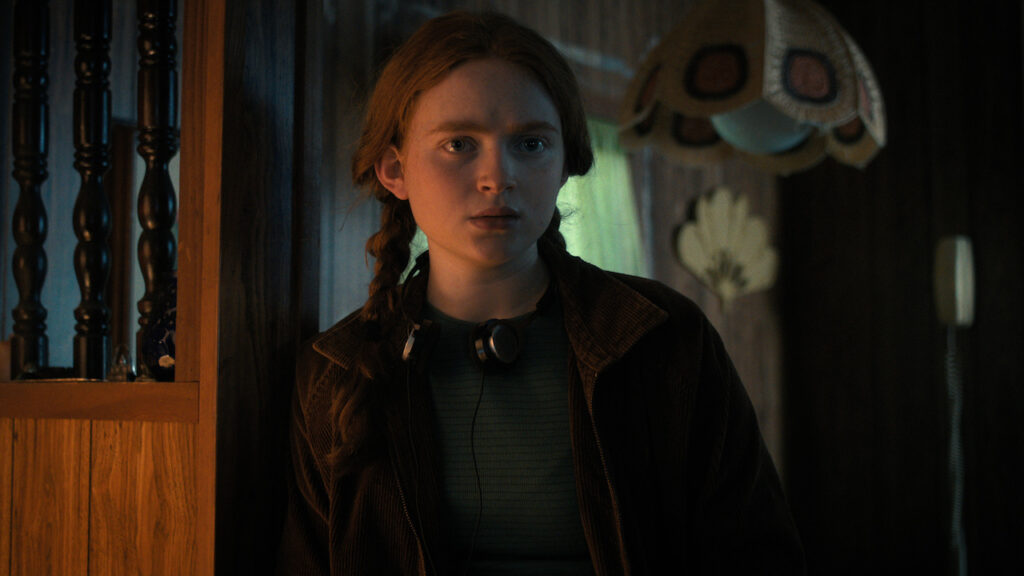
The structural mundanity of The Whale compels you to turn your attention to its most pressing, vexing question: What exactly does it have to say about obesity? The movie revolves entirely around the issue of Charlie’s weight—even his mild pleasantries with an unseen pizza guy function to generate the purportedly gruesome spectacle of him stuffing his face with countless varieties of junk food—but its message strikes me as either simplistic or judgmental. It takes pains to extend empathy to Charlie (Fraser reportedly consulted with the Obesity Action Coalition), but the sum total of its argument—remember, fat guys are people too—isn’t just obvious and banal; it’s also undermined by the film’s very premise. “I wasn’t always like this,” Charlie says at one point, and the implication is that where he used to be normal, he is now grotesque. His obesity isn’t just a crippling medical condition; it’s the ultimate form of human degradation.
I wonder what Charlie would make of this reading. He earns his living teaching online as a composition instructor (he strategically keeps his camera turned off), and his primary point of emphasis to his students is that they need to write with greater honesty. This sets the stage for another putatively powerful sequence—which Aronofsky naturally heightens for (ostensibly) maximum impact—in which Charlie reads brief submissions of lacerating self-reflection. But just because a piece of writing is confessional doesn’t make it good. And while The Whale may be rigorously, punishingly heavy, it is anything but profound.
Grade: C+
Jeremy Beck is the editor-in-chief of MovieManifesto. He watches more movies and television than he probably should.
